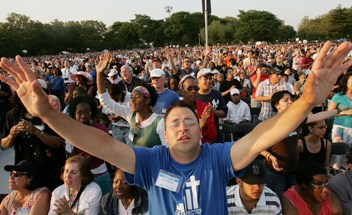
In Toronto, Canada, my girlfriend worked as a teacher and community organizer in a Deaf center affiliated with an Evangelical church.
She is out of the closet, has short hair that she spikes up most days and often invited me to work functions as her partner. Her job, while incredibly rewarding was more insecure than most: as a religious organization, her employer could legally fire her at any moment for being gay.
So imagine my surprise when the New York Times published an op-ed yesterday describing a new "great compromise" on gay marriage that essentially provided for marriage rights with religious exemptions. That proposal sounds a lot like Canadian law.
In fact, exceptions to the general recognition of same-sex unions for religious organizations is a part of almost every gay marriage law around the world.
In the Netherlands, where same-sex marriages became legal in 2000, the Protestant Church's congregations are given complete discretion over whether they perform gay marriages. In South Africa, religious institutions and individual civil officers are given the right to refuse to conduct same-sex marriage ceremonies. In Norway, the same sex-marriage law passed this year allows the entire Lutheran Church (the largest religious organization in the country) to refuse to perform same-sex marriages.
Equality provisions in the American Constitution are far less robust than those in Canada or in South Africa or many other countries. Yet, religious organizations in those countries don't have to hire gay people, don't need to have gay pastors and don't need to provide benefits to existing gay employees. In Canada, churches that discriminate against gay people are still exempt from paying property taxes.
Now, I strongly oppose tax breaks for religious organizations that actively discriminate. I do not want my money used to support the campaign to undermine my own rights. Still, coming from a country like Canada where public Catholic education is constitutionally guaranteed, I understand that compromise with religious institutions is sometimes necessary.
And the truth is, that the compromise between religious freedom and gay rights has worked well . It may be that any deviation from that compromise would illegally infringe constitutionally protected religious rights in the U.S. and would certainly cause unnecessary opposition to the equal rights movement.
If this is the great compromise, then gay marriage should be on the short term agenda in Federal politics. The U.S. would just be following in the footsteps of many other developed countries in the world. Gay marriage advocates have never been interested in forcibly quashing the churches and organizations that feel compelled to oppose homosexuality. We are in support of the free exercise of religion and the freedom of speech.
All we really want is the same legal status as the people who work so hard to condemn us.
When my girlfriend left her job at the Deaf center to return to school they threw her a lovely good-bye party. Her co-workers, both religious and non-religious, are still good friends. This, despite the fact that many of the people in her office building believe fervently that homosexuality is a sin.
What Canada has found is that, with a little time, religious organizations and equal rights can co-exist peacefully. That co-existence leads to tolerance from some quite unexpected places.
